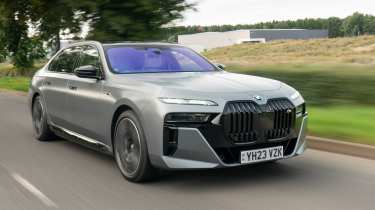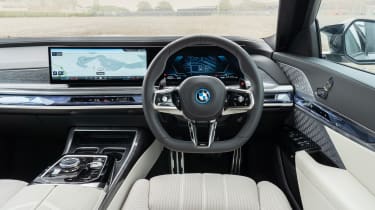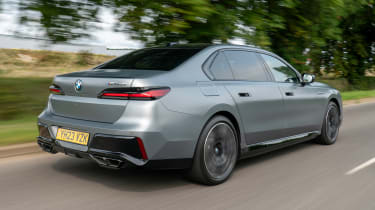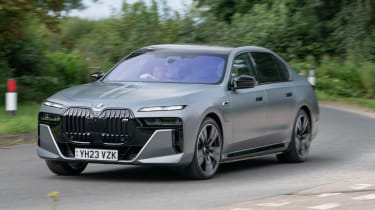BMW 7-series 2023 review – the world's most advanced luxury car?
The BMW M760e is a marvel of high-tech luxury, but the 750e offers all the best bits for a lot less money
The BMW M760e doesn’t make a particularly good first impression. Walk up to the driver's door with the key in your pocket and it unlocks, as most modern cars do. You can then either grab the door handle and swing it open normally, or – and this is the option to impress your friends – push a button to open it electronically. Cameras detect how far to open the door to avoid chipping the expensive satin grey paintwork against other cars and obstacles; very clever, except it doesn’t account for the fact that there’s a person – you – standing in front of it.
The door will nudge a few centimetres ajar and stay there as you stand waiting for it to open, which it wont. Eventually, and by the time you’d be about to set off in another car, you’ll pull the door open in frustration and climb inside. So yes, a poor first impression. But stick with it, because doors aside, the latest 7-series is one of the most technically impressive, advanced luxury cars you can buy today.
The M760e is a display of BMW’s full engineering might. Sitting at the pinnacle of the 7-series lineup as an M-tuned six-cylinder hybrid limo, it costs from £119,305 and competes squarely with the similarly priced Mercedes S580e, but also plug-in Range Rover variants. BMW’s mixed-metal CLAR platform has been stretched and adapted for use here (and in the all-electric i7), and unlike previous 7-series, this latest G70 version is only available with an extended wheelbase, giving rear passengers more space to stretch out.
More reviews
Our test car came equipped with the £22,000 Ultimate option pack, and while that may cost as much as an entire Volkswagen Polo, it does include an enormous suite of luxury kit including multi-way adjustable, massaging front and rear seats, an illuminated glass roof, crystal glass switchgear, electric blinds, an upgraded Bowers & Wilkins audio system and yes, those aforementioned automatic doors. The party piece, however, is the 31.3-inch Theatre Screen that drops down from the roof to stream video content to rear-seat passengers on the move. It'll almost certainly look dated in a decade or so, but ultra-luxurious cars have always stretched the envelope with next-level tech, and as of now, the Theatre Screen is quite the show-stopper.
Perhaps BMW's biggest achievement here is the integration of all this functionality. The cabin is vastly more imaginative than that of a Mercedes EQS, focusing on the quality of your surroundings rather than the quantity of screens. Ambient lighting seeps through transparent inlays throughout the cabin, and every surface – from the wood inserts to the metal accent trims – feels sumptuous, tactile and expensive. There isn’t the subdued, effortless class of previous versions, but this has been replaced by a thoroughly modern, bespoke feel that’s a match for anything at this price or well beyond. It’s a testament to BMW’s dual-screen iDrive 8.5 infotainment system that it doesn’t feel out of place here despite being shared with the 3-series – it’s sharp, feature-rich and relatively easy to decipher using the crystal rotary controller.
With a 3-litre turbocharged straight-six working in tandem with a 194bhp electric motor, the M760e generates 563bhp and a 590lb ft wallop of torque. Drive is sent to all-four wheels via an eight-speed torque converter ’box and BMW’s xDrive system, and while the M760e weighs 2525kg and certainly isn’t geared towards outright performance, its 4.3sec 0-62mph time is quick enough to trouble a Porsche 718 Cayman GTS.
From the driver’s seat the M760e feels enormous, and unless you look in your mirrors, it almost feels like you’re at the wheel of some kind of pseudo-crossover (at 1544mm it’s actually taller than a Ford Puma). Flick the drive selector backwards and the M760e sets off in eerie silence, but there’s a comforting familiarity here – namely through the steering, which immediately relays the light, crisp, linear rate of response typical of modern BMWs. The M760e comes equipped with rear-axle steering as standard and it’s a far more manoeuvrable car than you might expect, pivoting around tight corners and mini roundabouts with a twist of the arms.
Adding an M or AMG suffix to a cosseting luxury saloon can sometimes breed an incongruity to the driving experience but BMW hasn’t fallen for that trap with the M760e. With the dampers set to Comfort mode there’s a pillowy absorbance to the two-chamber air suspension, despite M-specific tuning. Potholes pass under the wheels with a light thump and surface imperfections are smothered with ease, and while the ride quality is superb by normal standards, there isn’t the almost freakish blend of compliance and control that the iX SUV achieves. The M760e is more susceptible to the slight shudder and vertical float that afflicts most air-sprung luxury cars.
With an 18.7kWh battery on board the M760e can achieve up to 48 miles of silent pure electric running, and even when the petrol engine kicks in, it barely intrudes on the almost vacuum-like cabin insulation. A bigger issue is the interlinking of the power sources, as it sometimes feels like the two are tripping over each other with fluctuating throttle inputs. On one occasion in slow moving traffic the petrol engine engaged and sent a judder through the car, lunging it forwards – BMW has had years to hone the calibration of its hybrid systems, and it could be better in the M760e.
Still, the electric motor does a good job of smothering torque holes in the straight-six and the M760e is capable of enormous, effortless speed. It feels every bit as muscular as its power figure suggests but, crucially, the delivery is never violent or overly dramatic – it simply thunders up to your chosen speed with a muted six-cylinder hum.
On bucking, undulating tarmac, switching to the firmer of the two damper settings brings a stark improvement in vertical control, but a good deal of that underlying plushness is lost in return. In fact, ratcheting up to Sport mode for either the powertrain, steering or suspension feels like you’re strangling the core character of the M760e with more noise, more effort and less outright comfort, but if you really go looking for it, there’s a surprising level of dynamic ability deep beneath the surface. Even when you pick up the pace the 7-series can be placed accurately and offers glimmers of the progressive, rear-led balance that makes smaller, inherently sportier xDrive models so capable and indulgent.
In this transitionary period towards electric cars, BMW has been more conservative than its key rivals with its development direction. Where Mercedes is committing to dedicated electric car platforms for its new EVs, mainstream BMWs have been designed to accommodate ICE and electric powertrains on the same architecture. Crucially, and as demonstrated by both the i7 and 7-series, this provides a consistent, defined feel across all these models, and for the most part, it feels like BMW is at the top of its game with both propulsion sources.
In truth, the M760e’s biggest rival comes from within: the 750e. Also equipped with a plug-in hybrid straight-six – this time with 482bhp – the 750e offers the same opulence and luxury appeal as the flagship for more than fifteen grand less. It’s difficult to justify the diminishing returns offered by the M760e, even if that’s unlikely to deter the client base it’s aimed at.








